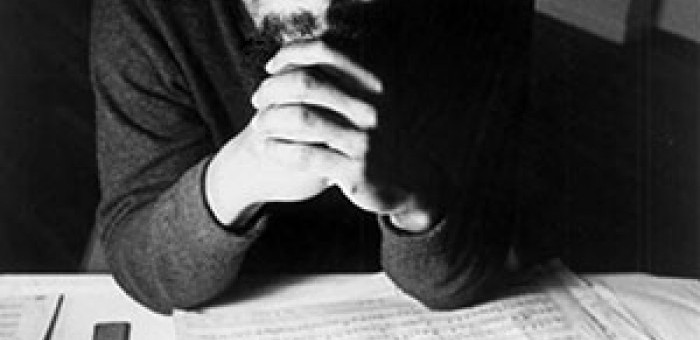Jan 13, 2026 2:09 PM
More Trump-Kennedy Center Cancellations
The fallout from the renaming of the John F. Kennedy Center for the Performing Arts to include President Donald…

Lawrence D. “Butch” Morris (Photo: Cathie Marquesee)
(Photo: )Bandleader, conductor and cornetist Butch Morris died on Jan. 29 at Veterans Affairs Medical Center in Brooklyn, N.Y., from cancer. He was 65.
Morris was famous for a method he invented and named “conduction.” Morris trademarked the term, which referred to the improvised interaction between a conductor and an ensemble.
Morris conducted ensembles using his own unique set of gestures and symbols. He introduced the concept in 1985 and documented it with recordings such as Conduction No. 1, Current Trends In Racism In Modern America, which included saxophonists John Zorn and Frank Lowe; Conduction No. 22, Documenta: Gloves & Mitts; and Conduction No. 41, New World, New World.
On Morris’ website, a page devoted to conduction workshops lists this definition: “Conduction (conducted interpretation/improvisation) is a vocabulary of ideographic signs and gestures activated to modify or construct a real-time musical arrangement or composition. Each sign and gesture transmits generative information for interpretation by the individual and the collective, to provide instantaneous possibilities for altering or initiating harmony, melody, rhythm, articulation, phrasing or form.”
Morris taught conduction workshops around the world and was the recipient of numerous grants, including ones from the National Endowment for the Arts and the New York Foundation for the Arts.
Prior to his career as a bandleader, Morris established himself as a cornet player. He collaborated with his brother, bassist Wilber Morris; trumpeter Bobby Bradford; soprano saxophonist Steve Lacy and tenor saxophonist David Murray. In recent years, he worked with the band Burnt Sugar.
Morris taught music in France and the Netherlands in the late ’70s and then moved to New York in 1981.
Lawrence Douglas Morris was born in Long Beach, Calif., on Feb. 10, 1947. As a boy growing up in Los Angeles, he played trumpet in the school orchestra.
Morris (whose father served in Navy) served in the Army in 1966 and was stationed in Germany, Vietnam and Japan.
Morris is survived by a son, Alexandre; a brother, Michael; and a sister, Marceline. (Wilber Morris died in 2002.)
At midnight (EST) on Friday, Feb. 1, radio station WPFW (89.3 FM and www.wpfw.org) will pay tribute to Morris with a two-hour program titled “His Friends Called Him Butch.” The first hour will include excerpts from a 1989 interview with Morris, and the second hour will include comments from George Mason University professor Dr. Thomas Stanley, who wrote his dissertation on Morris’ conduction process.
Information on Morris and conduction is posted at the artist’s website.
—Bobby Reed

Belá Fleck during an interview with Fredrika Whitfield on CNN.
Jan 13, 2026 2:09 PM
The fallout from the renaming of the John F. Kennedy Center for the Performing Arts to include President Donald…

Peplowski first came to prominence in legacy swing bands, including the final iteration of the Benny Goodman Orchestra, before beginning a solo career in the late 1980s.
Feb 3, 2026 12:10 AM
Ken Peplowski, a clarinetist and tenor saxophonist who straddled the worlds of traditional and modern jazz, died Feb. 2…

The success of Oregon’s first album, 1971’s Music Of Another Present Era, allowed Towner to establish a solo career.
Jan 19, 2026 5:02 PM
Ralph Towner, a guitarist and composer who blended multiple genres, including jazz — and throughout them all remained…

Rico’s Anti-Microbial Instrument Swab
Jan 19, 2026 2:48 PM
With this year’s NAMM Show right around the corner, we can look forward to plenty of new and innovative instruments…

Richie Beirach was particularly renowned for his approach to chromatic harmony, which he used to improvise reharmonizations of originals and standards.
Jan 27, 2026 11:19 AM
Richie Beirach, a pianist and composer who channeled a knowledge of modern classical music into his jazz practice,…